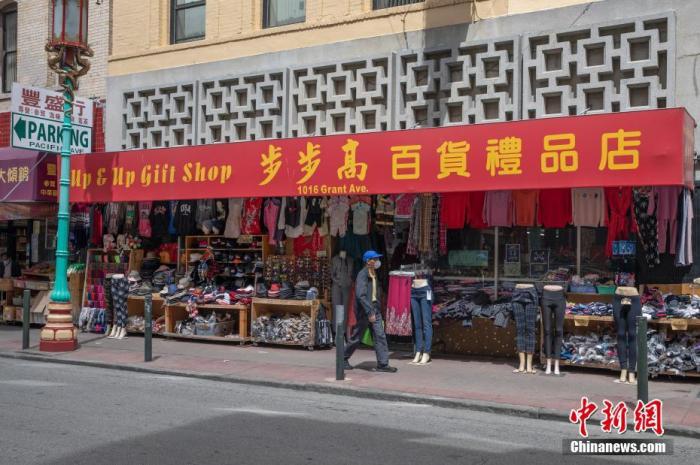China Overseas Chinese News, September 1, according to the US "Overseas News" report, the epidemic has not only caused social and economic shrinkage, but also brought xenophobic problems to San Francisco's Chinatown.
Even so, the residents of Chinatown are still full of hope for the future.
"San Francisco Chronicle" (San Francisco Chronicle) published an article by Bay Area author Melissa Hung (Transliteration) on August 30. Her personal experience has witnessed the "rebirth" of Chinatown.
The article is excerpted and translated as follows:
Data map: On May 18, local time, a man wearing a mask passed by a shop in Chinatown in San Francisco, USA.
Photo by China News Agency reporter Liu Guanguan
During the epidemic, our living habits were more or less subverted.
Previously, I used to take a crowded bus to San Francisco’s Chinatown, swim back and forth in the YMCA pool, buy a barbecued pork bun at East Asian Bakery, and sit on the benches in the Garden Corner Square to enjoy the food.
Although I have never lived in Chinatown, I feel at home here. The people around you speak Cantonese and I can talk to them in a clumsy way.
My family has taken root here.
A hundred years ago, a predecessor from my mother's village traveled across the ocean to settle in San Francisco's Chinatown.
Therefore, I was heartbroken when I saw the struggle in Chinatown during the epidemic—locals and tourists no longer appeared on the streets, and shops along the street were closed.
Chinatown suffered a "double disaster" in the early stages of the pandemic, said Malcolm Yeung, executive director of the non-profit organization Chinatown Community Development Center.
The epidemic itself has come fiercely, and it is also entangled with racism.
Yang Chongxian said: “Because xenophobes have long referred to the new crown virus as the'Chinese virus', the number of tourists in Chinatown has been greatly reduced before the stay-at-home order was issued.”
In previous years, January and February were usually busy periods around the Lunar New Year, and the profit that merchants could earn accounted for 30% of their annual income.
But this year, business in Chinatown shops has fallen sharply, and restaurants with meager profits have been hit particularly hard.
Restaurants are not only vital to the Chinatown community, for new immigrants, they can also be used as a source of entry work.
A few weeks ago, the Chinatown Community Development Center conducted a survey of 32 restaurants.
The results showed that 70% of restaurants said they were not sure whether they could make it to the end of the year.
Currently, community groups have stepped up to provide help.
The Bailan Democratic Association has created an online directory of restaurants in Chinatown to provide diners with a list of restaurants that will be open during the epidemic.
Many restaurant owners have language barriers and do not use computers, so they do not maintain websites or open social media accounts.
Online catalogs can help them solve this problem.
The Chinatown Community Development Center also collaborated with other organizations to launch a program to fund 34 restaurants in Chinatown to support the lives of the most vulnerable residents in the area.
In addition, the Chinatown Community Development Center also cooperates with the China Chamber of Commerce to help restaurants set up outdoor dining venues.
However, since most restaurants in Chinatown are located on streets with large undulations, this transition is difficult to complete.
Yang Chongxian is particularly worried about the fate of large restaurants in Chinatown.
"Large restaurants are the cultural backbone of Chinatown. Here, we all gather to meet each other, reconnect, and celebrate each other." Yang Chongxian said that hundreds of banquets are held here every year.
"If these restaurants die, nothing can replace them. And this may destroy the cultural fabric of Chinatown."
However, Chinatown has a history of surviving adversity, and there are signs that this neighborhood will also withstand this test this time.
"I don't want to see the epidemic become a catalyst for the demise of Chinatown." Yang Chongxian said, "We are in an unstable period."
Prior to this, the maintenance of the Chinatown community has always attracted attention, and the current epidemic has made it more urgent to solve this problem.
Mabel Teng, a former assessment recorder in San Francisco and a longtime advocate of Chinatown, believes that even if the grocery stores and restaurants in Chinatown are restored, it will not be enough to rebuild the community's economy.
"I think that Chinatown needs to create something novel to make it a tourist destination that can attract major regional tourists and international tourists to stop and stay." Under her vision, Chinatown will become a brand new cultural center.
The experience of Chinatown during the epidemic made me sad, but the history of Chinatown, its spirit of self-improvement, and the help and struggle of community organizations gave me hope.
Chinatown has overcome difficulties, and she will continue to survive.
(Finish)

